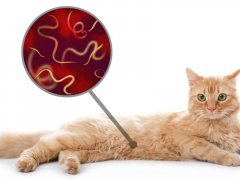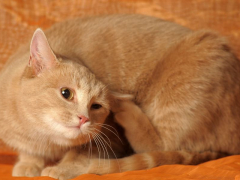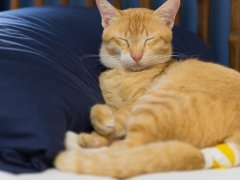
Thanks to the advent of modern medicine, cats are living longer than ever. One of the challenges that comes with being the guardian of an elderly feline companion is feline cognitive dysfunction, otherwise known as feline dementia.
Similar to Alzheimer’s disease in humans, feline cognitive dysfunction can cause senior cats to experience disorientation, cognitive decline, disruption of the regular sleep-wake cycle, changes in social interaction, and more.
If you are caring for an aging cat, then here is everything you need to know about feline dementia.
How Common Is Dementia in Cats?
This is a hard question to answer because the diagnosis of feline dementia is relatively new in veterinary medicine. The condition is likely more common than we realize because it is not often reported nor recognized by cat owners.
In addition, several other health conditions, including advanced kidney disease and hyperthyroidism, can mimic the signs of feline cognitive dysfunction, making it difficult to recognize the disease.
What Are the Symptoms of Dementia in Cats?
Dementia is associated with older cats. Mental impairment is usually noticed in cats older than 10, and feline dementia is usually seen in cats advanced in age – 15 years and older.
The most common signs associated with feline dementia are changes in behavior and mental abilities. Signs of dementia may include:
- Appearing confused and trapped in corners
- House soiling: inappropriate urination or defecation outside the litter tray
- Being asleep and awake at different times
- Increased vocalization in the form of meowing or yowling vocalizing
- Increased matting and grooming less
- Decreased responsiveness
- Increased fearfulness or aggression, hiding more
- Not enjoying activities, like playing, pouncing, or hunting like they used to
- Forgetting any previous training
- Sleeping more
- Pacing or wandering aimlessly, getting lost
- Weight loss and/or loss of appetite
Cat Dementia Diagnosis
Feline dementia is a ‘diagnosis of exclusion’, i.e. a veterinarian will rule out any other diseases that could cause similar signs. If all other problems are ruled out, then diagnosing feline dementia is applied.
As previously stated, conditions like hyperthyroidism can mimic the signs of feline dementia. Conditions like osteoarthritis, diabetes mellitus, deafness, blindness, Cushing’s syndrome, advanced kidney disease, cancer, and heart disease can also cause signs that are similar to feline dementia.
Consequently, your veterinarian will want to take an oral history from you, conduct a full physical exam, and run appropriate tests. Depending on what your veterinarian notices on the physical exam, testing could include bloodwork, urine tests, and fecal exams.
Additional tests may be ordered if your vet finds a specific problem. Additional tests can include x-rays, abdominal ultrasound, a biopsy of the affected organ, or referral to an ophthalmologist, neurologist, or other specialists.
Cat Dementia Treatment
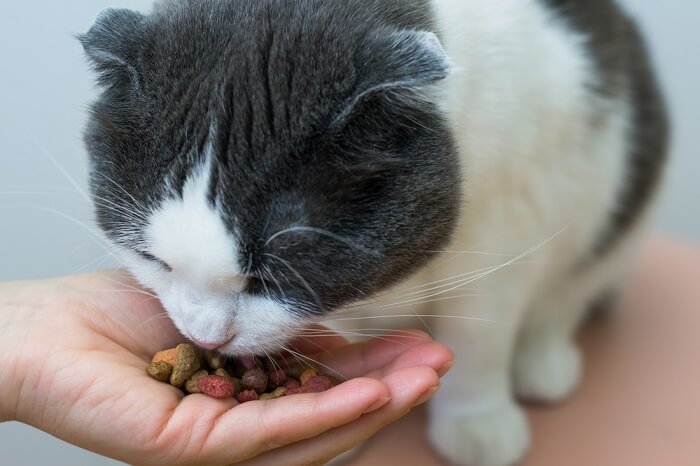
There is no treatment for dementia, but you can help to make life easier for your cat and potentially slow the disease’s progression.
Unfortunately, there is no cure for feline dementia. However, there are many things you can do to potentially slow the progression, and there are ways to modify your cat’s environment to maximize your cat’s health, well-being, and cognitive abilities.
1. Engage Your Cat in Mental and Physical Stimulation
To maintain top brain function, you must use it or lose it. Enrichment is an important part of geriatric cat health. Make sure to play with your cat every day, and engage your cat with brain teaser games.
Food puzzles are a wonderful way to get cats to use their brains, you can buy them readymade or you can make them yourself. If your cat will tolerate a leash, take your cat on short walks so that your cat can have safe, outdoor visual and physical stimulation.
These activities will help keep your cat’s brain young.
2. Feed Your Cat’s Brain With Good Nutrition
Purina has found that cats that are fed a diet containing omega 3 fatty acids, antioxidants, B vitamins, and arginine did better on mental tests of learning, mental flexibility, and memory. Feed your cat a high-quality, easily digestible senior diet formulated to meet the needs of aging cats.
Also Read: The 10 Best Cat Slow Feeders & Puzzle Feeders
Living With Cat Dementia
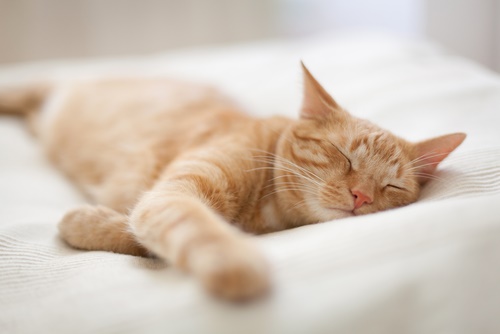
If your cat has dementia, it can be helpful to make some adjustments to their environment.
There are a couple of rules that will facilitate living with a cat with cognitive impairment.
1. Try Not To Move Your Cat’s Stuff
If you move your cat’s food bowl or water bowls and litterbox, chances are they may not find it again. Maintaining this structure will reduce stress and anxiety and help your cat to be more successful.
2. Provide a Peaceful Environment for Geriatric Cats
Cats with cognitive dysfunction may have higher anxiety than other cats. Try not to add a new pet to your household if you have an aging cat with health issues.
You can also help your cat by minimizing traffic and noise in your home, not moving furniture, and not having large gatherings of people (if you do, make sure your cat is in a quiet, safe area of the house). using Feliway products designed to reduce anxiety may also help cats with cognitive dysfunction.
3. Maintain Regular Veterinary Checkups
Older cats need regular care to continue to age well. Veterinary medicine is advancing rapidly in the field of geriatric medicine, and you may be surprised at how well your vet can help your pet.
There is no doubt: cats with dementia represent special needs cats. We know, however, that there is great reward in caring for the least of these, even if it is ‘just a cat’.
While your furry angel may require you to make a couple of accommodations, there is no doubt the reward of helping a cat live well into advanced age is great. Don’t forget to enlist the aid of a veterinary ally you trust: this person will have the knowledge you need to make the best decisions for your cat.
